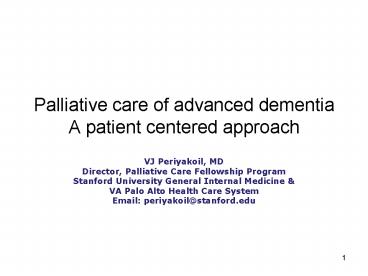Palliative care of advanced dementia A patient centered approach PowerPoint PPT Presentation
1 / 18
Title: Palliative care of advanced dementia A patient centered approach
1
Palliative care of advanced dementia A patient
centered approach
- VJ Periyakoil, MD
- Director, Palliative Care Fellowship Program
- Stanford University General Internal Medicine
- VA Palo Alto Health Care System
- Email periyakoil_at_stanford.edu
2
Main Message
- Currently, patients with dementia do not get
access to quality palliative care - Access to quality palliative care can be
facilitated only if we take an inter-disciplinary
approach to care
3
Talk Agenda
- Current state of palliative care for dementia
- Key challenges in providing palliative care for
dementia patients - Prognostication
- Decision making
- Advance care plan
- Symptom management
- Caregiver stress
4
Prognostication questions in dementia
- Patients question How long do I have before
my mind is shot? - Health professionals question Is s/he
eligible for palliative care? - Familys question How long does s/he have to
live ? - Caregivers question I am exhausted. How much
longer can I do this? - Is dementia a terminal illness? If so, when do
they start dying?
5
Dementia hospice eligibility
- Stage 7 or beyond according to the FAST scale
- Unable to ambulate without assistance
- Unable to dress without assistance
- Unable to bathe without assistance
- Urinary or fecal incontinence, intermittent or
constant - No meaningful verbal communication, stereotypical
phrases only, or ability to speak limited to six
or fewer intelligible words - Plus one of the following within the past 12
months - Aspiration pneumonia
- Pyelonephritis or other upper UTI
- Septicemia
- Multiple stage 3 or 4 decubitus ulcers
- Fever that recurs after antibiotic therapy
- Inability to maintain sufficient fluid and
calorie intake, with 10 percent weight loss
during the previous six months or serum albumin
level less than 2.5 g per dL (25 g per L)
Schonwetter RS, Han B, Small BJ, Martin B, Tope
K, Haley WE. Predictors of six-month survival
among patients with dementia an evaluation of
hospice Medicare guidelines. Am J Hosp Palliat
Care 200320105-13.
6
Decision making in dementia
- Hierarchy of decision making
- Pt with capacity
- Advance directive
- Health care proxy
- Living will
- Substituted judgment
- Best interests
- Competence v. capacity
- Special circumstances
7
Special circumstances
- Case 1 Incapacitated pt with no proxy and
unknown preferences - Case 2 Chronically mentally ill pts with no
capacity - Case 3 Chronically mentally ill pts with
fluctuating capacity
8
Intact decision making prior to death in the
elderly
Lentzer HR et al The quality of life in the
year before death. Am J Public Health 82
1093-1098, 1992
9
Interface between palliative care and dementia
- Clarity of decision making
- Soft balls ( relatively speaking)
- Advanced dementia with advanced other terminal
illness - Early dementia with early stages of other chronic
illness - Hard balls
- Moderate dementia with other terminal illness
- Dementia, terminal illness, infection and
delirium - Dementia and PTSD or depression
- Dementia and recreational ETOH/ drug use
The decisions themselves are never easy.
10
Advance care planningShades of Gray
- Possible levels of care
- Full court press
- Hospitalize with DNR
- Hospitalize for reversible illness
- Do not hospitalize (DNH) treat to the extent
possible - DNH with comfort care
11
Heroic life prolonging measures
- CPR
- Whopper no veggie
- Artificial nutrition
- Artificial hydration
- Antibiotics
- What are the goals of care?
James Hallenbeck, personal communication
12
Tube feed or not tube feed? Thats the question
- The facts
- Effect on life span is an open question
- Increases suffering
- Need for better pt/family education
- Discussing benefits and burdens of therapy
- Use neutral language
- Separate facts from your opinion
- Please offer your opinion
- Make allowances for special circumstances.
13
Palliative care symptoms and cognitive impairment
- Symptoms
- Bio
- Pain
- Non-pain symptoms
- Psychological issues
- Social issues
- Spiritual issues
- Presentation of these symptoms is skewed
14
What does dying look like?
- Decline in functional status
- Lack of desire to eat or drink
- Withdrawn
- Sleep- wake state
- Mottling of limbs
- Jaw movement
- Death rattle
- Co-morbid symptoms
15
???
- Unpaid
- Overworked
- On-call 24/7
- Sleep deprived
- No social life
- Poor support system
16
Notes
- Questions / feedback
- Please contact VJ Periyakoil
- periyakoil_at_stanford.edu
- hospice_at_va.gov
- ___________________________________
- ___________________________________
- ___________________________________
- ___________________________________
- ___________________________________
- ___________________________________
17
Notes
- ___________________________________
- ___________________________________
- ___________________________________
- ___________________________________
- ___________________________________
- ___________________________________
- ___________________________________
- ___________________________________
- ___________________________________
18
Notes
- ___________________________________
- ___________________________________
- ___________________________________
- ___________________________________
- ___________________________________
- ___________________________________
- ___________________________________
- ___________________________________
- ___________________________________

